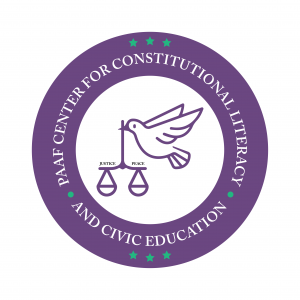
PAAF CENTER FOR CONSTITUTIONAL LITERACY & CIVIC EDUCATION
We present this unity document of Nigeria constitution of our beloved and great country in order to educate our patriotic Nigerians home and abroad for greater efforts in developing our country into nationhood and inculcate new mindsets in our youths to pull down the strongholds of ethnic sentiments to fill the valleys of inferiority complexes limiting us as a nation.
The founding fathers of democracy and constitutional governance knew exactly what they wanted. They wanted a government that derives its power from the people and its governance from a set of rules and laws called “The Constitution”. The constitution, in their view, should be a document written to limit the authority of government and protect the right of men.
The founding fathers believe that if tyranny and oppression must be put in check, if dictatorship and authoritarianism must be prevented from taking root, power must be derived from the people and governance must be regulated by the constitution. Constitution therefore must be the “Bible & Quran” of governance.
For instance, it is not mere coincidence that countries that adhere to the norms and principles of democracy fair better and make enormous progress while countries who observed those principles only in their breaches often lagged behind. That, in essence, mean that democracy and constitution on their own do not guarantee good governance, it is the collective adherence of both the government and the people to the tenets of democracy that usher in the dividends that often come with a genuine democratic practice. And in this sphere, the role of the people is critically important, but only to the extent that they are empowered to acquire constitutional literacy that enable them play that role effectively. This is in fact, the real essence of the translation of this book Nigeria constitution into three major languages to begin with.
In most struggling democracies around the world (and this applies to Nigeria too), the role of constitutional literacy in advancing the cause of democracy is often taken for granted. Only the striving democracies understand that their citizens can participate in governance only to the limit of their understanding of their civic duties and responsibilities. Majority of Nigerians actually believe that their civic role and obligations begin and end with their participation in local or general elections. And the general “suspicion” is that the ruling class, including the political leadership in those countries, deliberately promotes constitutional and civic illiteracy to weaken the people’s ability to demand accountability from those they elect.
Like an American constitutional expert rightly observed, in a constitutional democracy, productive civil engagement requires the knowledge of the history, principles and foundation of democracy and the ability to participate in civic and democratic processes. Nigerian citizens can only demonstrate effective civil engagement if they are provided with civic education and are empowered with constitutional literacy. And in this context, civic and constitutional education is the key to how people participate in the governing of their society.
Political observers in and out of Nigeria believe that the reason Nigeria is in such a quagmire today is mostly because a vast majority of youths and adults do not have a working understanding of the constitution, let alone their civic responsibilities. And because they lack these understanding, they are unable to hold their leaders accountable for their failure to fulfill the mandate they swore to defend and for which they were elected.
Giving this background as explained above, it becomes easy to see how civic education and constitutional literacy are both crucial to the performance of government and the attainment of the rule of law. Achieving that goal therefore should not be left alone to government, they are, in fact better promoted by the media and civil society institutions, both at local, national and international levels. The Prince Ade Ajayi Foundation is proud to be at the forefront of this crusade to emancipate our people through civic education and constitutional literacy. The foundation realizes that true emancipation cannot be achieved through passive following but rather though intentional choices.
This Nigeria Constitution book translated into three major languages will address several aspects of civic and constitutional governance in Nigeria. It will seek to task all relevant stakeholders in Nigeria with the responsibilities of leading the way for people’s empowerment.
After two decades of Nigeria’s experimentation with democratic governance, it has not translated to any significant social and economic justice for our people. We therefore owe it a duty to restore hope in our people and restore faith in governance. Restoring both hope and faith will awaken that patriotic zeal that seeks the best for our country. It will also make governance more responsive to the needs of our people. We dedicate this translated constitution to Nigerian civil rights leaders, past and present, leaders who have risked (and even gave) their lives in the quest for civil and economic progress in Nigeria.
In launching this book, we expect all stakeholders, including the traditional institutions, to move in solidarity with us. And we know that our contributions (and those of others) to the evolution of the Nigeria of our dreams will not be in vain.
We seek peace. We seek progress. We seek good governance. And we seek lasting freedom for our people. And we will continue to seek other avenues to realize our goals and aspirations. And all of these will be done within the context of a dynamic world.
Thanks
Visioner,
Prince Ade Ajayi.
